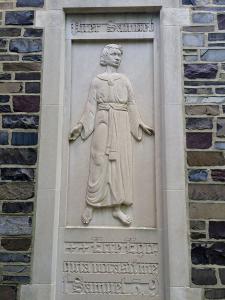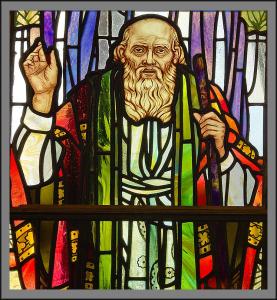 As I said in my last post, I propose to tell a story of my own devising rather than explain and exegete in traditional ways this summer’s texts from the books of Samuel. However, a short introduction to the following story may be useful as a way of focusing on what I find in this tale. It is common for interpreters to read in the account of the rise of kingship in Israel a thoroughly negative appraisal of the desire for a king and a complete defense of Samuel’s rejection of kingship on purely religious grounds. I disagree with what I think is that simplistic assessment of the text as written, and I hope my story will indicate why I find the usual reading inadequate. Here is today’s story.
As I said in my last post, I propose to tell a story of my own devising rather than explain and exegete in traditional ways this summer’s texts from the books of Samuel. However, a short introduction to the following story may be useful as a way of focusing on what I find in this tale. It is common for interpreters to read in the account of the rise of kingship in Israel a thoroughly negative appraisal of the desire for a king and a complete defense of Samuel’s rejection of kingship on purely religious grounds. I disagree with what I think is that simplistic assessment of the text as written, and I hope my story will indicate why I find the usual reading inadequate. Here is today’s story.
For decades the prophet Samuel had been the undisputed leader of the disparate tribes of an emerging Israel. Following his call by YHWH at the small shrine of Shiloh, he had seized authority over the political and religious lives of the peoples of the hill country of the land, becoming judge—that is legal and social arbiter—from Bethel to Gilgal to Mizpah, in other words throughout the territory known as the land of Israel. His home base was Ramah from where he judged the land and where he built a well-known altar to his God. And he raised a family there, just as any Israelite male of the time would be expected to do. Indeed, he and his wife had two strapping sons, the pride of any Israelite household.
But Samuel had a problem. His two boys, Joel (“YHWH is God”) and Abijah (“My father is YHWH”) were simply evil. As they grew, they had no use for the puritan and narrow ethics of their famous father. They were interested in money and power, using their family name as a means to success and wealth. They acted only for money, resorting to hefty bribes for any who wished their favorable legal rulings, and judging not on the basis of justice and equity but on where the most money could be had. Whenever a poor man brought a justified grievance to their attention against a man of greater wealth, they inevitably found the man of wealth innocent and gleefully pocketed the offered bribe that led to the “legal” outcome.
Despite Joel and Abijah’s quite public practice, and despite the fact that Samuel well knew of their devilish actions—he was told often enough by many aggrieved and abused citizens—he nevertheless appointed these wastrels judges over the southern city of Beersheba, many distant miles from Ramah. He hoped perhaps that they might mend their ways after some real experience in leadership. After all, Samuel was old, and had begun to look for a successor as chief judge and leader of Israel. Who else should he choose but his own sons?
But the people of Beersheba quickly had their fill of the foul Joel and the repulsive Abijah and brought their grievances to the other elders of the land, alerting them to the horrors of the boys and warning them that if they ever were to become successors to their father, that the land would be ruined and their lives subject to tyranny and dictatorial abuse. And the elders quickly came to Samuel to voice their fears and to demand that their prophet act to ensure that stability would exist after the old man’s death, rather than the potential foul rule of his two appalling sons. They had of course noticed that all the nations surrounding their own were ruled by kings, and that a monarchy offered a far more certain and stable way to govern a people over time than an uncertain and uncontrollable “movement of the spirit” that chose leaders in what appeared arbitrary ways. They liked and trusted Samuel, whose life had been exemplary in every way, and whose leadership of the land had been superb, but these awful sons were not to be tolerated. “Make us a king to govern us,” they cried, “like other nations.”
But when Samuel heard their demand for a king, he was furious and would have none of it. In part, he may have felt that their desire for a king was a rejection of YHWH, a religious apostasy that could not be allowed, but the greater reason for his fury was that he was being rejected and his plans for a Samuel dynasty that would rule the land forever. Yes, he imagined and knew, his sons were not quite yet up to the standards that he himself had set, but surely the reports of their behaviors were an exaggeration. Given time, Joel and Abijah would rise to the task of leadership and Samuel could go to Sheol in peace, knowing that his sons were his able successors.
When he prayed to YHWH about this disgusting demand for a king, YHWH immediately told the prophet that it was not he, Samuel, who was being rejected—his prayer had obviously suggested that reality—but it was YHWH who was the rejected one. However, prayer can be a strange thing, an act only done by one person toward God. Any interpretation of what one is told by God in the way of answer to prayer is of course the prayer’s alone. Samuel heard YHWH speaking, but his hearing was heavily influenced by his desire for an eternal dynasty, begun by him and continued by his sons.
After his session of prayer, he announced to the assembled elders that kings were foul things, untrustworthy as leaders, only interested in power and control, and if they ever got one they would be deeply sorry that they ever wanted such a terrible thing. But the people still demanded a king, and Samuel still stood firm that he would never give them one, despite their demands and despite the fact the he had imagined that he had heard YHWH say three times that he should choose a king for them. Again and again, he warned them against the multiple dangers of kings, even incredibly telling them that his sons were still with them, those appalling boys, but their minds were made up—they insisted that Samuel choose a king for them, and so he finally does but only when the massive Saul is literally brought to Ramah, looking for a herd of lost donkeys.
Samuel finally gives them a king, but in several ways he undercuts the power of the king and at the last publically rebukes, humiliates, and deposes that king by way of saying that only he is ruler in Israel and no king will ever stand in his way of power. Samuel is hardly the first person whose judgment was clouded by reasons other than righteous ones, however much he claims that he is the pure spokesperson of YHWH, nor will he be the last. Our own time is filled with “prophets,” claiming to be mouthpieces for the divine on earth, but who in the end are all too human in their desires for power and wealth. Samuel, alas, is till alive and well and living among us, and at times, within us.
Images from Wikimedia Commons











